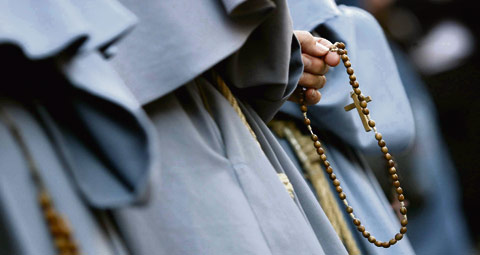September 2 | ![]() 0 COMMENTS
0 COMMENTS ![]() print
print

Piety should be only expressed behind closed doors
RONALD Rolheiser, a Catholic priest and member of the Missionary Oblates of Mary Immaculate, is president of the Oblate School of Theology in San Antonio, Texas. Visit his website, www.ronrolheiser.com
“And when you pray, do not imitate the hypocrites: they love to say their prayers standing up in the synagogues and at street corners for people to see them. … But when you pray, go to your private room, shut yourself in, and so pray to your Father who is in that secret place.” (Matthew 6, 5-6)
FOR whatever reason, as churches and as individuals, we have been slow to take seriously Jesus’ warnings against displaying our piety in public.
Yet Jesus is very clear, and very strong, in warning us not to do intimate private acts of prayer, devotion, and asceticism in public. Moreover, in this warning, he does not distinguish as to whether these acts come from a sincere heart or a false one. Sincerity or insincerity is not the only issue that concerns him. Public display of piety, however sincere, is also the problem.
Why? What is wrong with public displays of piety? Don’t they serve as an inspiration to others? What is wrong with putting our private hearts on display in public might be answered in one word: aesthetics. It is bad art, art that irritates more than it inspires. It is unhealthy exhibitionism. Why? Because piety is a form of intimacy and intimacy needs propriety. Intimacy is a deep private bond between persons and that private bond demands that deep intimate expressions of affection should be done in private.
This is not abstract. We all know that love should be made behind closed doors. Intimacy, in its very structure, demands discretion, privacy, propriety, a shielding from public gaze, something which the early Church called the discipline arcane.
That is why we find ourselves uncomfortable when we see people who are too openly affectionate in public. Our spontaneous reaction, to avert our eyes, to feel uncomfortable, to wish this was not happening in front of us, is a healthy one because what we are seeing is an unhealthy exhibitionism, even if the affection between the two people is healthy.
It is not the love that is wrong; it is the public display that is unhealthy. Intimate affection needs to be more sacred in guarding itself with privacy and propriety.
The same is true for private prayer, private devotions, and private acts of penance. Whether sincere or not, public display of them is unhealthily exhibitionistic. When Jesus warns us to do our private prayers and our private penances behind closed doors He is, admittedly, warning against hypocrisy, against being seen as good as opposed to actually being good. But He is also warning against the public display of private devotion itself, no matter how sincere.
For example, the early Church practised something it called the discipline arcane. This was a practice within which any Christian who had been baptised and was participating in the Eucharist was forbidden to bring a non-baptised friend to the Eucharist or even describe to another person what happens at a Eucharist. The instinct here was not to create some kind of secret cult around the Eucharist, but to guard its intimacy. For them, the Eucharist was like making love, something done behind closed doors.
I was lucky enough to see this healthily enacted in my own parents, both in their prayer lives and in their relationship to each other. My mother and father had a deep affection for each other, but they never put that affection on public display. Indeed, we would sometimes catch them holding hands and sitting together when they thought nobody was around. Their prayer lives were the same. Both had a deep Faith marked by piety, but both were also careful to keep their more intimate acts of prayer and devotion private. Both too tended to cringe when they saw too overt a display of either affection or piety in public. Perhaps that is why I have a certain genetic resistance to overt displays of piety.
But, for the most part, we have been reluctant to take Jesus’ warning on this seriously. Sometimes in fact the reverse is true and public display of private devotion is held up as an ideal. To cite an example, several years ago, I was at a Sunday Mass which was being presided over by an auxiliary bishop. Just before he was to receive Communion, in front of a congregation of more than 500 people, he, in all sincerity and reverence, put his arms on the altar, placed his face down inside his arms, and stayed in that posture of adoration for over a minute, while the entire congregation had nothing to do but to watch him make that private act of reverence. At the time, I was only irritated by something that I considered out of place, bad timing, bad art, but I was more taken aback afterwards by comments outside the church, ‘Wasn’t that wonderful!’ ‘What a deep Faith!’
Deep Faith, probably. Wonderful, no. There’s a good reason why we spontaneously squirm in the face of overt gestures of intimacy that are meant really to express private emotion.











